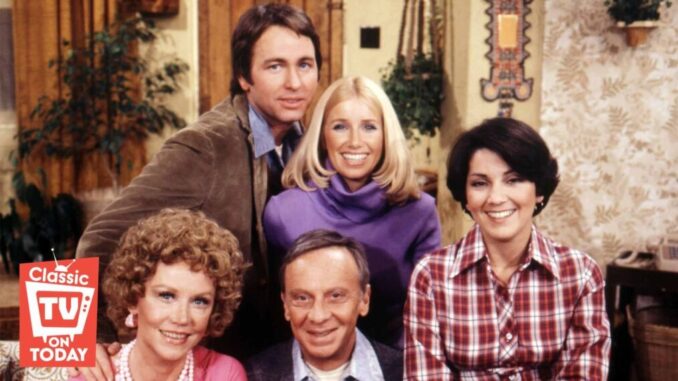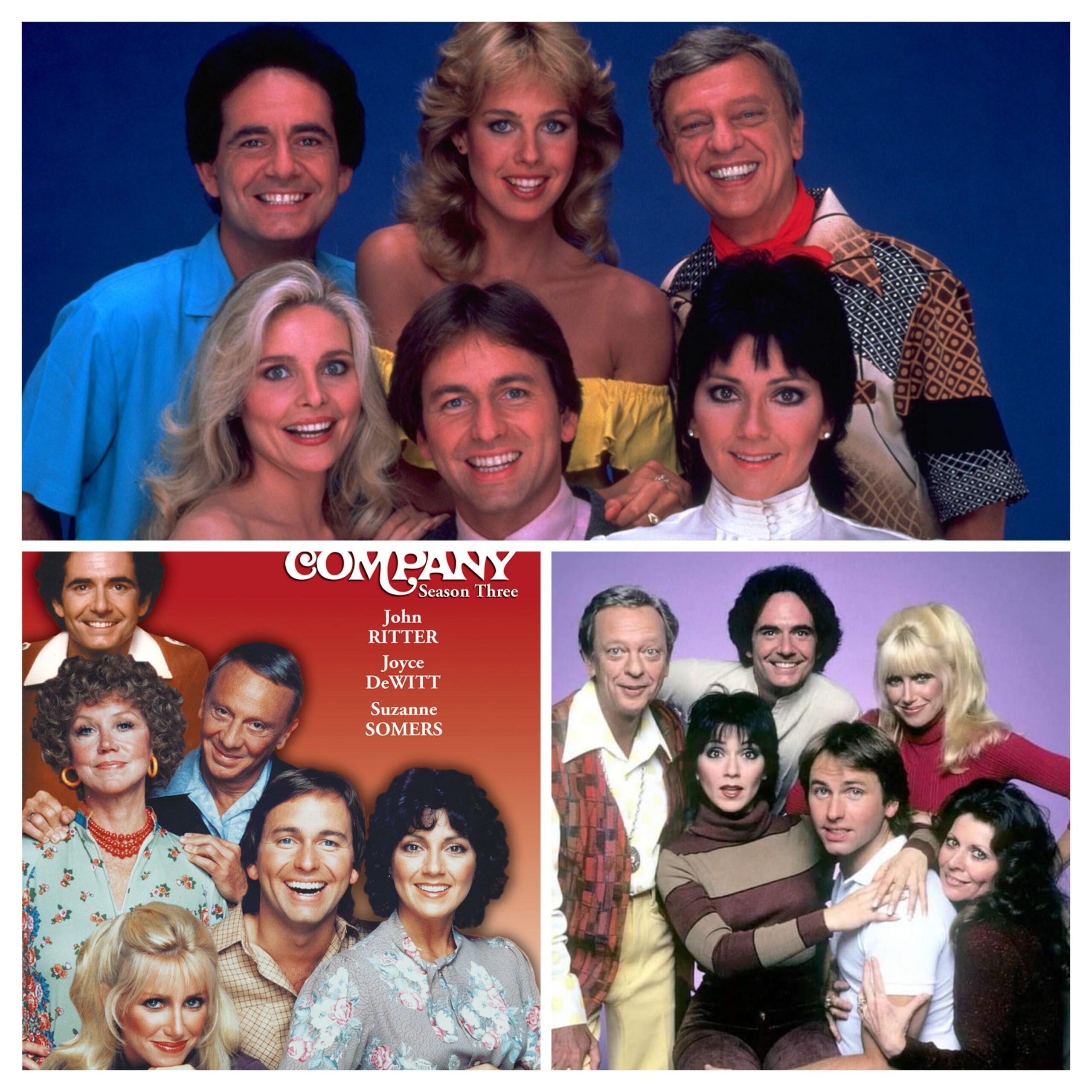
Hers and Hers and His: Remembering “Three’s Company” on its 40th Anniversary
“It’s amazing how such a silly comedy can help energize our spirits by helping us appreciate the absurdities of life. Three’s Company is a constant reminder that such a shift in perspective can help us deal with the less-than-pleasant things in life.” — Come and Knock on Our Door author Chris Mann
Digital Bits and History, Legacy & Showmanship are pleased to present this retrospective to celebrate the 40th anniversary of Three’s Company, the sitcom starring John Ritter as Jack Tripper, which showcased his comedic exploits with his two female roommates, friends, and nosy landlord. [Read more here…]
To celebrate, The Bits has a Q&A about the hit series, and who better to ask than author and Three’s Company authority Chris Mann.
Chris Mann is the author of Come and Knock on Our Door: A Hers and Hers and His Guide to Three’s Company (St. Martin’s, 1998 – you can order a copy from Amazon by clicking here or on the book cover image below). The writer, consultant, and digital media producer also served as a consulting producer on NBC’s 2003 premiere-week hit Behind the Camera: The Unauthorized Story of Three’s Company.
As a magazine art director, he has produced and directed cover, editorial, and video shoots with actors such as Eva Longoria, Gilles Marini, Cheryl Ladd, and Joyce DeWitt, and best-selling authors including the thought-leader Marianne Williamson. In his more than 20 years as a freelance journalist, he has written for TV Guide, the Los Angeles Times, Emmy Magazine, and other entertainment publications while interviewing actors, authors, physicians, and professional and Olympic athletes for numerous health and fitness magazine cover stories focusing on body, mind, and spirit.
He is currently working on two follow-up books: a biography of Three’s Company star John Ritter and a behind-the-scenes look at the iconic CBS game show The Price is Right.
Michael Coate (The Digital Bits): How does Three’s Company deserve to be celebrated on its 40th anniversary?
Chris Mann: It deserves it because it is a timeless classic that changed the landscape of television sitcoms, even as critics still refuse to praise it as a contemporary French farce that helped redefine the family sitcom genre. The show’s timelessness is due in no small part to the continuing appeal of the late great John Ritter—whose talents also live on in his children, two of whom, sons Jason and Tyler, have starred in sitcoms of their own.

Three’s Company continues to air on Antenna TV and Logo. Last month, I was present at a taping of the cast retrospective that aired during Antenna TV’s recent 40th anniversary celebration. Richard Kline choked up as he talked about John, and Jenilee Harrison lit up as she fondly remembered him as a kind colleague and family man.
Even though Jenilee was only on the show for two seasons, she remains a part of the Three’s Company family. She spoke to me in the sweetest terms about my book—and how she brought her own copy for the rest of the cast to sign. In that moment, I remembered why this show resonated with people: because it was about a group of people who really cared about each other. That alone made it a prime candidate for celebration.
Coate: Can you describe the first time you watched Three’s Company?
Mann: I grew up in the Bible Belt in rural Oklahoma. Luckily, my mother had a more open mind about the difference between “family” and “adult” programming, so I was allowed to watch Three’s Company but not, say, Soap. Our television seemed to always be tuned to ABC, as I remember watching everything from Laverne & Shirley and Welcome Back, Kotter to Charlie’s Angels and S.W.A.T. starting in late 1975, when I was 3 years old.
So I definitely remember watching Three’s Company in its first season in the spring of 1977. I didn’t get the sexual subtext. Instead, I was drawn to John Ritter’s physical comedy. The scene where Jack Tripper, startled, leaps like a frog into the bathroom in the sixth episode, It’s Only Money, made me laugh out loud.
That episode premiered on my fifth birthday (April 21, 1977). My mother and sister laughed too, but my father hated what he angrily called “The Idiot Box” — and sometimes threatened to “throw it out the window.” I knew he wasn’t joking.
Still, imitating John Ritter’s easygoing, funny-loving persona as Jack Tripper sometimes seemed to disarm my father, and Iny cases from a young age, to escape life’s dramas — if only a momentarily, to sort of release tension with laughter. It’s amazing how such a silly sitcom can help refuel the spirit by helping us appreciate life’s absurdities. Three’s Company constantly reminds that such a shift in perspective can help us tackle the not-so-funny stuff in life.
Coate: What was the objective with your Three’s Company book?
Mann: My intention with Come and Knock on Our Door always was to celebrate the show, give proper recognition to the farcical stylings and often underappreciated talents that made it a hit and — once and for all, and above all — uncover and tell the true human story behind a once-controversial if critically misunderstood sitcom and its stars’ successes, struggles, breakthroughs, setbacks, harmonies, conflicts, losses and eventual triumphs.
In addition to being groundbreaking in large part due to its premise (A young, engaging male lead pretends to be gay so his suspicious landlords let him live with two young, engaging women?! In primetime?! In Middle-American living rooms?! How will we protect the children?!), Three’s Company became a blueprint of sorts for how a hit series survives “moral” outrage and other negative publicity, tumultuous backstage and public feuds, show-changing cast exits and the bitter, lingering breakups of its original stars — all while continuing to emanate the love and generate the laughter that attracted millions of viewers in the first place.
As a journalist, as an enthusiast and just as who I am as a human being, it was imperative for me to get to the heart of the matter with truth, integrity, love, empathy and, where appropriate, the quality I’ve always found the most disarming and healing: humor. I realized early on that achieving my objective meant going well beyond the sort of “extended episode guide” approach I’d seen in other TV books. Instead, it required essentially penning four biographies in one: The no-holds-barred life story of Three’s Company and, at least insofar as they are interconnected and pertain to this life-changing experience, the transformational stories of its three original stars.
At its core and beyond its pratfalls, double entendres and misunderstandings, this sitcom was about chemistry, relationships and, ultimately, understanding — and so, too, was my book. (And folks use to say Three’s Company wasn’t deep! HA!) Did I do justice to my mission of saluting, illuminating and attempting to bring back together a former TV family? Readers’ heartfelt online reviews and my battle scars seem to suggest so!
